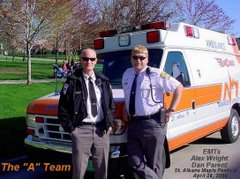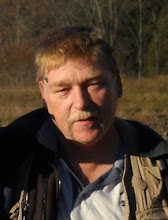A cool call yesterday. As I've mentioned in here before, we run in a pretty rural district. Most of the more outlying squads run with volunteers and it is sometimes a challenge to get a crew together for a call. People are at work or whatever. And then there may not be an ALS provider available. Simple fact is that there are a lot more EMT'B's and First Responders than there are I-Techs.
We (AmCare) were called to intercept a Franklin Rescue ambulance for a call for a patient with a severe asthma attack. Difficulty breathing is one chief complaint that calls for ALS care if available. Franklin's call was in the farthest reaches of that town, nearly to Enosburgh, about 20 miles from AmCare. Enosburgh's crew was out on a call and their unit 2 is out of service, so while their service is much closer, they couldn't take the call. We were the closest, so with Alex driving (The A-Team!), we went code-3 about 20 miles to meet their truck. It was my call, so when we did meet up with the other ambulance, I jumped in (with our monitor/AED and our jump bag). A quick review from the two B's in the back got us up to speed as the Franklin ambulance high-tailed it code-3 to NMC. The patient had a very tachy rhythm and though apparently well oxygenated, would have these periods of stridor like breathing and slip into seizure. I felt the heart rate contraindicated additional bronchodialators (the pt. had 3 neb treatments at home), so we mostly monitored her airway, got IV access and kept the BVM ready in case she arrested. We made it in and last I knew she was doing well.
The cool thing about the call to me was that even though I usually work with the same people all the time, jumping into a strange ambulance with 2 EMTs I'd never met, and picking up the case in the middle, we all worked together as a team, and it worked out well. I think that says a lot for the way that EMS is standardized, everyone learns it the same way, and thus, like interchangeable parts in a machine, we are able to work together in a pinch. That analogy is of course an oversimplification, but I think it works here. Come to think of it, when we find ourselves in an MCI, alot of squads are going to have to work together, so all the better that it went smoothly on this single-patient call.
After the call it was kinda neat to feel a new camaraderie with some other EMS people from our district.
Got some more stuff to talk about, I'll be back later.
One northern Vermont Emergency Medical Technician's journey through a career in Emergency Medical Services.
Why do I write this stuff?? To chase out of my brain the daily craziness of being an EMT in a rural area, despite the great people I get to work with.
Websites of Interest
- My Facebook Page
- Enosburgh Ambulance Flying Club blog
- MedicCast - Podcasts and EMS info
- Council for the Advancement of Pre-hospital Medicine
- EMTLife.com - Great Forums for EMS providers
- Rural EMS Resources
- EMS House - Good Stuff!
- 1st Responder News
- Journal of Emergency Medical Services
- AmCare Ambulance Service's website
- EMT City - Online Forums and Discussions on EMS
- State of VT Office of EMS
- You Tube!
Disclaimer!
The views expressed in this blog are those of the author only. I write what I believe, through my experience and knowledge, to be the truth. These entries do not reflect the views, opinions, policies, or philosophies of AmCare Ambulance Service, Enosburgh Ambulance Service, or anyone related to them other than myself.
Blog Archive
-
▼
2007
(58)
-
▼
March
(18)
- 48 Straight at EAS??
- City Fire Dept. Responding with AmCare EMS
- ALS Intercept
- March Training
- Busy, Crazy, WayOut 24 at AmCare
- Non-Paramedic increased Scope??
- Medical Director and expanded scope of practice
- Stuff
- 24 at AmCare
- Gripes and More Gripes
- Respiratory, man o man
- A New Host
- Cell Phone Samaritans
- Saturday 24 at EAS
- Transports and More Transports
- Back To it Tomorrow (Maybe)
- Home Again
- Another Tuesday 24
-
▼
March
(18)
Enosburgh Ambulance's New Truck

DanVTEMT with our new Demers' Millenium ambulance
About Me
The "A - Team"

Alex and I at the Maple Festival, St. Albans, VT, April 2006
Heroes
- Robert Kennedy - A great man and visionary of his time, cut down just when this counrty really needed his leadership.
- WWII Vets - We are losing these heroes all too quickly, but they are still everywhere in our society: Tell one of them "Thank-You", you owe it to them.
- Service Men & Women overseas. Regardless of how you may feel about the war, these men and women are putting it on the line everyday.
- Neil Young - A terrific outlook on life; with a career spanning over 4 decades, his music still gives me chills. And boy can he rock on his "old black" Gibson Les Paul!
My Favorite Quotes
"Few will have the greatness to bend history itself; but each of us can work to change a small portion of events, and in the total of all those acts will be written the history of this generation."
-Robert Kennedy
"It is not the critic who counts: not the man who points out how the strong man stumbles or where the doer of deeds could have done better. The credit belongs to the man who is actually in the arena, whose face is marred by dust and sweat and blood, who strives valiantly, who errs and comes up short again and again, because there is no effort without error or shortcoming, but who knows the great enthusiasms, the great devotions, who spends himself for a worthy cause; who, at the best, knows, in the end, the triumph of high achievement, and who, at the worst, if he fails, at least he fails while daring greatly, so that his place shall never be with those cold and timid souls who knew neither victory nor defeat."
-Theodore Roosevelt
"Citizenship in a Republic,
"Speech at the Sorbonne,
Paris, April 23, 1910
-Robert Kennedy
"It is not the critic who counts: not the man who points out how the strong man stumbles or where the doer of deeds could have done better. The credit belongs to the man who is actually in the arena, whose face is marred by dust and sweat and blood, who strives valiantly, who errs and comes up short again and again, because there is no effort without error or shortcoming, but who knows the great enthusiasms, the great devotions, who spends himself for a worthy cause; who, at the best, knows, in the end, the triumph of high achievement, and who, at the worst, if he fails, at least he fails while daring greatly, so that his place shall never be with those cold and timid souls who knew neither victory nor defeat."
-Theodore Roosevelt
"Citizenship in a Republic,
"Speech at the Sorbonne,
Paris, April 23, 1910


No comments:
Post a Comment